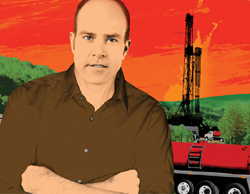sierraclub.org - sierra magazine - march/april 2011 - create
ROGUE ENERGY
When the "natural gas boom" is the sound of your lawn blowing up.
By Michael Brune
 Photo illustration: John Ritter; Brune photo Lori Eanes
Photo illustration: John Ritter; Brune photo Lori Eanes
On the way to our bright, shiny clean-energy future, here's a problem we need to solve: the methane gurgling from Craig and Julie Sautner's well.
Late last summer, I spent some time in northeastern Pennsylvania visiting folks affected by natural gas projects. In the small town of Dimock, as throughout the region, people had been getting sick and were unable to drink their tap water, do their wash, or even bathe safely because of high levels of contaminants in the water.
Craig and Julie Sautner live 976 feet from a hydraulic fracturing, or "fracking," operation. This involves forcing a highly pressurized mix of water, sand, and chemicals into shale formations to break up the rocks and dislodge the natural gas that's embedded within. Methane is the principal component of natural gas, and fugitive emissions of methane are a byproduct of natural gas production. The Sautners blame fracking for the methane in their well; so much of it has migrated into their water supply that to prevent an explosion they needed to install a methane separator in their basement and a vent in the well in their front yard. Standing on their front lawn, I could hear the methane gurgling nonstop.
Gas companies say that fracking dramatically increases the amount of usable gas reserves in the United States and will help reduce our dependence on coal and oil. But many people who live in communities where gas drilling and fracking is going on say it poses intolerable threats to rural landscapes, wildlife, air quality, and—in particular—the water supply. Both may be right.
It is true that fracking has vastly increased the natural gas supply, making it more competitive with coal and oil. Gas burns more cleanly than coal or oil, doesn't produce poisonous mercury or toxic coal ash, and doesn't involve stripmining or mountaintop removal. New studies, on the other hand, suggest that the amount of methane (an extremely potent greenhouse gas) that's released in natural gas production may be far greater than previously believed, so the jury is still out on its climate impact.
There is no doubt, however, that communities are hurting. On my trip, I learned that methane had escaped from a gas-drilling operation and was leaking into the Susquehanna River, miles from the drill site; that a man installing a slip-and-slide on his lawn for his kids suffered serious burns when methane released from the garden hose combined with a faulty switch and set him on fire; and that dangerous levels of methane built up in a woman's well and exploded, leaving a crater in her front lawn.
Some basic principles come into play here. If drinking water is being poisoned and front yards are exploding, that's obviously wrong, regardless of what is causing it, and the Sierra Club will stand with any family in the country that wants polluters to clean up their act. Unfortunately, thanks to the urging of former vice president Dick Cheney in 2005, fracking is exempt from the Safe Drinking Water Act. Other loopholes have exempted it from parts of the Clean Water Act, the Clean Air Act, the Resource Conservation and Recovery Act, the National Environmental Policy Act, and other federal regulations. These loopholes must be closed.
Beyond abiding by our nation's environmental laws, natural gas companies must be required to disclose all the toxic chemicals used in fracking and then substitute nontoxic fracking fluids. Toxic water should never be dumped in local rivers and streams, and all the water used in fracking should be recycled. Finally, gas production is not appropriate everywhere: There should be strict no-frack zones to protect communities and treasured landscapes.
The use of natural gas is expected to grow as we wean ourselves off oil and coal and shift to nonpetroleum, clean-energy sources. But natural gas will never be acceptable if it remains the under-regulated and unaccountable industry it is today.
MICHAEL BRUNE is the executive director of the Sierra Club. You can e-mail him at michael.brune@sierraclub.org and follow him on Twitter and Facebook.